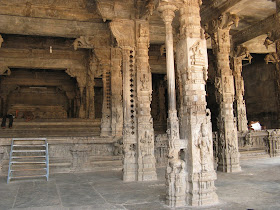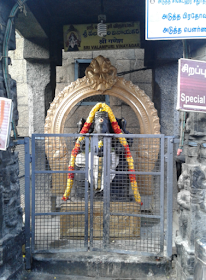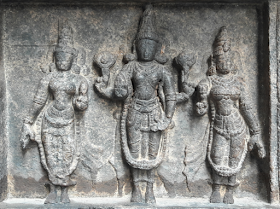Jalakandeswarar Temple – The Temple
The
temple is located in Vellore Fort. The Fort is surrounded by moats (Agazhi)
with water, to all three sides. The main entrance is located on the south side.
The Raja gopuram is of seven tiers and there are three prakarams. The Gopuram
of the tower is over 100 ft. in height. The Jalakandeswarar Temple is a
fine example of Vijayanagara Architecture. The temple has exquisite carvings on its gopuram
(tower), richly carved stone pillars, large wooden gates and stunning monoliths
and sculptures.
The
temple is adorned with some remarkable sculptures and the best is found on the
left side of the entrance, a verandah which contains monolithic pillars of
grandeur and delicacy of execution. There are impressive sculptures in the
temple particularly outside the swami shrine and inside the main mandapam. These
Vijayanagara sculptures are similar to the ones present in Soundara Raja
Perumal Temple, Thadikombu, Krishnapuram Venkatachalapathy Temple, Srivilliputtur Divya Desam and Alagar
Koyil.
Hindu
Trinity with their consorts – Lord Vishnu with Mother Mahalakshmi, Lord Brahmma
with Mother Saraswathi and Lord Shiva with Mother Parvathi grace the devotees
in the temple. The temple also has a Mandapam, with the hall supported by carved stone pillars of
dragons, horses and Yalis (lion like creature). The temple itself built in
middle of a water tank (called Agazhi in Tamil), and there is water surround the temple like a
garland. The circumference of the water tank is 8000 ft.
Main
Deity in the temple is Siva Lingam known as Jalakandeswarar (Jalakandeswarar means
‘Siva resides in water’) and his consort known as Akilandeswari Amman. Urchavar
here in this temple is Somaskandar, Chandrasekharar. Sthala Vriksham is
Vanni. Kalyana Mandapam is located after entering inside through Rajagopuram. The
wedding hall or the Kalyana Mandapam of the temple is as beautiful as the 1000
pillared Mandapam in Madurai Meenakshi Sundareswarar temple.
The wedding
hall inside the temple has a 2 faced sculpture, that of a bull and an elephant.
Pushkarani and Golden Chariot in a closed shed are located to the
right side of Kalyana Mandapam. The water user for bathing the deity
(abishekam) is drawn from an ancient well called the Ganga Gowri Theertham,
within the temple. The well has a natural spring in itself and not dug. A
Siva Lingam found from the well is installed near and it is well known
as Ganga Palaru Eswarar. As we move further, Kala Bairavar, Navagrahams
and Saneeswarar are seen.
There is
an earthern lamp on the Balipeeta behind the Adhikara Nandhi (the bull vehicle
of Lord Shiva) which would revolve when some people place their hands on it.
The revolving is said to indicate that their wishes have been granted. But it
doesn’t revolve in all the cases and till today nobody knows the reason. Some
devotees of the temple worship the golden and silver lizard sculptures and the
snake sculptures in order to get relief from 'Sarpa Dosham'. On the Kanu
Festival or Mattu Pongal day (January), special abisheks are performed to
Adhikara Nandhi.
The
sanctum sanctorum is a small low building and at the entrance there are
dwarakapalas in blue granite. Sculpture work on the ceilings and pillars are
rich in its characteristics. Kodi Maram and Nandi are located in front of
sanctum facing Lord Jalakandeswarar. Inside the Garbha graham main
deity Jalakandeswarar is seen in Linga form with Rudraksha mala mandapam
above him. Goddess Akilandeswari Amman is seen in separate sanctum in the
inner prakaram of the temple when we go around the main sanctum. To the outer
walls of Amman sanctum we get the darshan of Vinayakar, Madeswari,
Vaishnavi, Varahi, Lakshmi and Saraswathi.
In the
outer prakara there is a well which has a stone door way opening on a point
which is usually below water level. The underground mandapa or Neerazhi Mandapa
is said to lead to a subterranean passage leading to the River Palar. A torch
called Navasakthi Jyothi is in front of the Goddess – Amman shrine. It
never extinguishes and round in shape. The main flame (Jyoti) is at the
centre and eight around it. A great lamp above the Jyoti has a diameter of 27
inches representing the 27 stars starting from Ashwini to Revathi. This is
called Star Deepa – Nakshatra Deepa.
Inner
prakaram can be accessed through another gopuram and a huge Valampuri Vinayakar
is located here. Shrines of Selva Vinayakar, Venkatesha Perumal, Subramanyar
with his consorts Valli and Devayani, and Adi Sankara, 63 Nayanmars as stone
sculptures, Saptha Kanniar and Veerabhadrar are located in the inner prakaram. Shrines
of Vinayakar, Dakshina Moorthy, Mahavishnu, Brahma, Durgai, Urchava moorthy of
63 Nayanmars, Somaskandar and Valli Devasena idols can be found in the third
prakaram.
























































































